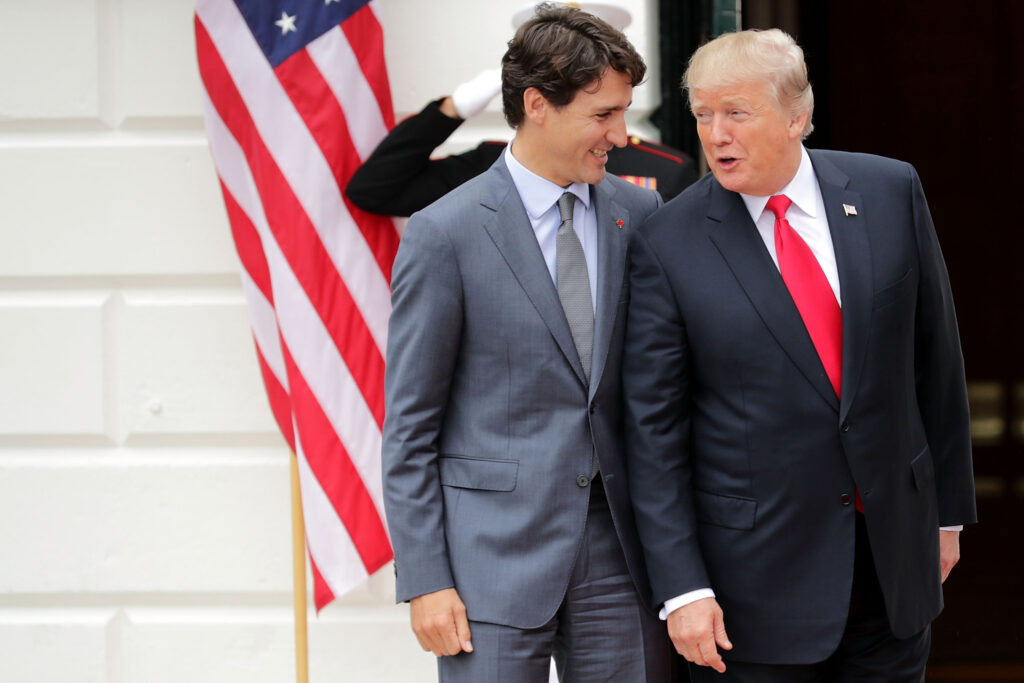What’s New
Canada’s government has unveiled a $1.3 billion plan to enhance border safety and immigration systems amid looming threats from President-elect Donald Trump to impose a 25 percent tariff on Canadian goods.
The strategy includes advanced technology, increased law enforcement resources, and better cross-border cooperation with the U.S.
It aims to tackle illegal drug trafficking, strengthen border inspections, and streamline immigration processes.
Newsweek has contacted Canada’s government and the opposition Conservative Party for comment via email.
Jean-Sébastien Comeau, a spokesperson for Dominic LeBlanc, Minister of Finance and Intergovernmental Affairs, told Newsweek: “This investment of $1.3 billion will make our borders even stronger by increasing support to law enforcement agencies to detect, intercept fentanyl and precursors, enhancing operational coordination to combat organized crime, and by creating a tactical force with helicopters, drones and officers to provide 24/7 surveillance at border hotspots and the areas between them.
“Canada’s Border Plan will also minimize unnecessary volumes at the Canada-U.S. border while preserving the integrity of our immigration system, and make sure that it is well-managed and sustainable. This enforcement-focused plan gives front-line officers the tools they need to secure communities, in both Canada and the U.S.”
President-elect Donald Trump (R) and Canadian Prime Minister Justin Trudeau in Washington, DC, in 2017. Canada’s government unveiled a $1.3 billion plan to enhance border safety and immigration systems amid looming threats of Trump tariffs.
President-elect Donald Trump (R) and Canadian Prime Minister Justin Trudeau in Washington, DC, in 2017. Canada’s government unveiled a $1.3 billion plan to enhance border safety and immigration systems amid looming threats of Trump tariffs.
Chip Somodevilla/Getty
Why It Matters
Trump has threatened to slap a 25 percent tariff on all goods from Canada, as well as Mexico, if the country does not clamp down on immigration and illicit narcotics.
Canada’s Prime Minister Justin Trudeau is under fire from his ministers, facing calls to quit amid economic turmoil, and his position will only worsen if he fails to stave off U.S. tariffs. The new funding package is designed to do that by bolstering security infrastructure at Canada’s borders, including the installation of advanced technology, the hiring of additional personnel, and the expansion of training programs for border officials.
But opponents from his own party are dismissing his policies as political gimmicks which will be ineffective.
What To Know
Key initiatives in the plan include the introduction of biometric screening for all travelers and the deployment of artificial intelligence to assist in risk assessments and the detection of smuggling activities.
The Canada Border Services Agency (CBSA) will train more dog teams and deploy chemical detection tools at high-risk ports, adding to its 80 existing detector dog teams nationwide. In addition to these security measures, the plan focuses on streamlining immigration processes, ensuring faster and more efficient entry for legitimate travelers while preventing illegal crossings.
Customs and Border Protection (CBP) data shows agents encountered migrants more than 198,000 times at the northern border in the 2024 fiscal year, more than seven times the encounters in 2021.
“As everyone is aware, thousands of people are pouring through Mexico and Canada, bringing Crime and Drugs at levels never seen before. Right now a Caravan coming from Mexico, composed of thousands of people, seems to be unstoppable in its quest to come through our currently Open Border. On January 20th, as one of my many first Executive Orders, I will sign all necessary documents to charge Mexico and Canada a 25% Tariff on ALL products coming into the United States, and its ridiculous Open Borders,” Trump said on November 25.
He shared the plan on Truth Social, presenting it as a measure to combat drug trafficking and reduce illegal immigration. This proposal aligns with promises he made during his 2024 presidential campaign to strengthen border security and curb the flow of drugs.
Trudeau flew to Trump’s Mar-a-Lago residence in Florida on November 29, where the pair had an “excellent conversation,” according to the prime minister. Trudeau was the first G7 nation leader to meet with Trump after the election.
At home, Trudeau is facing a political rebellion. Chrystia Freeland, the deputy prime minister and finance minister, announced she was resigning on December 16 in a letter that accused Trudeau of engaging in “costly political gimmicks.”
She also said that the two had been “at odds about the best path forward for Canada” as divisions have ripped open within the Liberal Party over policies and governance.
What People Are Saying
LeBlanc said in a statement: “Canada takes pride in our border and law enforcement agencies that protect our communities and support our economy day in and day out. They also expect their government to support them in their ability to do that important work—and that’s exactly what Canada’s Border Plan will do.”
Marc Miller, Minister of Immigration, Refugees and Citizenship, said in a press release: “We must preserve the integrity of our immigration system and make sure that it is well-managed and sustainable. As we continue working with the United States to protect the safety of both sides of the border, we continue to offer protection to the world’s most vulnerable while maintaining an immigration system that Canadians can trust.”
Pierre Poilievre, leader of Canada’s opposition Conservative Party, said on X (formerly Twitter): “After 9 years of these Liberals, our immigration system is a complete disaster.”
What Happens Next
Trump is expected to implement tariffs in a bid to strong-arm Trudeau and Canada over immigration policies.
However, Trudeau’s political future remains uncertain as Canadians will vote in a federal election next year, meaning there could be a new leader.
Canada’s Conservative Party is currently leading in the polls, finishing the year with a huge 21-point lead, enough to deliver them a huge majority government of over 200 seats, according to CBC News.
Update 12/19/24, 2:03 p.m. ET: This story was updated with comment from Comeau.
Source link : https://www.newsweek.com/canada-border-security-trump-tariff-threats-2004132
Author :
Publish date : 2024-12-20 03:37:00
Copyright for syndicated content belongs to the linked Source.
